I am using StringReader to read an xml stream and then I want to read that stream as XML to Serialize and Desiarilize it. Although it was working fine for some reason my XmlReader variable returns null. The XML as I see is the same as before.
My code is:
StringReader stringReader = new StringReader(result);
stringReader.ReadLine();//omit the first line that contains xml encoding
XmlReader xmlReader = XmlReader.Create(stringReader);
XmlSerializer XmlSerializer = new XmlSerializer(typeof(ResponseDoc));
ResponseDoc XmlResponseDoc = (ResponseDoc)XmlSerializer.Deserialize(xmlReader);
The XML format of the result viariable is
<?xml version="1.0" encoding="utf-8"?>
<ResponseDoc xmlns:xsi="http://www.w3.org/2001/XMLSchema-instance" xmlns:xsd="http://www.w3.org/2001/XMLSchema">
<response>
<entitylineNumber>1</entitylineNumber>
<statusCode>Success</statusCode>
<entityUid>0BA0C06E9CBAA3D890D025A37A577DDB074BA9A9</entityUid>
<entityMark>1000000115468</entityMark>
</response>
</ResponseDoc>
My xmlReader variable is null .I also tried to remove the stringReader.ReadLine(); but it didn't change anything. I used that because if the encoding line exists it fails to serialize it.
The ResponseDoc class :
#region XSD Schema
[XmlRoot(ElementName = "Responses", Namespace = "")]
public partial class ResponseDoc
{
private ResponseType[] responseField;
/// <remarks/>
[System.Xml.Serialization.XmlElement(ElementName = "Response", Namespace = "")]
public ResponseType[] response
{
get
{
return this.responseField;
}
set
{
this.responseField = value;
}
}
}
[XmlRoot(ElementName = "Response", Namespace = "")]
public partial class ResponseType
{
private int entitylineNumberField;
private string statusCodeField;
private string uid;
private string markUid;
private ResponseTypeErrors[] responseTypeErrors;
/// <remarks/>
[XmlElement(ElementName = "inv_number", Namespace = "")]
public string entitylineNumber
{
get
{
return this.entitylineNumberField.ToString();
}
set
{
this.entitylineNumberField = int.Parse(value);
}
}
/// <remarks/>
[XmlElement(ElementName = "StatusCode", Namespace = "")]
public string statusCode
{
get
{
return this.statusCodeField;
}
set
{
this.statusCodeField = value;
}
}
[XmlElement(ElementName = "Uid", Namespace = "")]
public string Uid
{
get
{
return this.uid;
}
set
{
this.uid = value;
}
}
[XmlElement(ElementName = "Mark", Namespace = "")]
public string Mark
{
get
{
return this.markUid;
}
set
{
this.markUid = value;
}
}
[XmlElement(ElementName = "Errors", Namespace = "")]
public ResponseTypeErrors[] Errors
{
get
{
return this.responseTypeErrors;
}
set
{
this.responseTypeErrors = value;
}
}
}
[XmlRoot(ElementName = "Errors", Namespace = "")]
public partial class ResponseTypeErrors
{
private ErrorType[] errorField;
/// <remarks/>
[System.Xml.Serialization.XmlElementAttribute("Error")]
public ErrorType[] error
{
get
{
return this.errorField;
}
set
{
this.errorField = value;
}
}
}
[XmlRoot(ElementName = "Error", Namespace = "")]
public partial class ErrorType
{
private string messageField;
private int codeField;
/// <remarks/>
[XmlElement(ElementName = "Message", Namespace = "")]
public string message
{
get
{
return this.messageField;
}
set
{
this.messageField = value;
}
}
/// <remarks/>
[XmlElement(ElementName = "Code", Namespace = "")]
public int code
{
get
{
return this.codeField;
}
set
{
this.codeField = value;
}
}
}
#endregion
UPDATE: I see that all of you give me answer about my XSD schema. The problem is not to deserialize the XML. My problem is that the variable xmlReader in
XmlReader xmlReader = XmlReader.Create(stringReader);
is {None} altough I have the xml answer in the result variable and I pass it to stringReader.
I don't understand why I some give me negative in my question. I believe it is quite clear what is my problem and I am sure I give enough information about my code.If I knew more I would solve it myself.
I have upload a screenshot as well with the strinReader and the xmlReader
